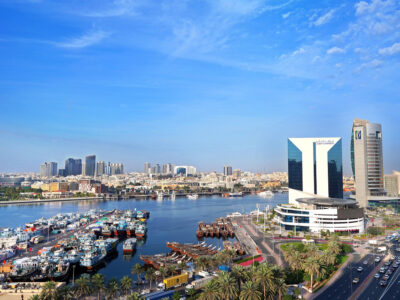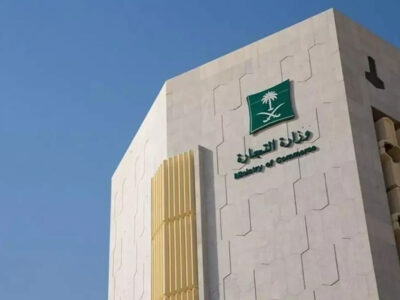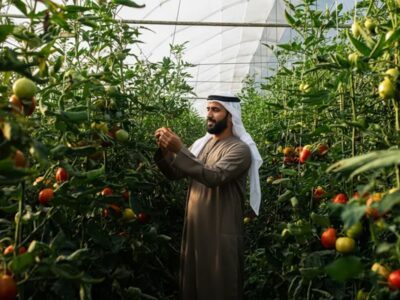Sustainability has shifted from a buzz word to a priority for corporations as climate change and global warming related challenges are becoming increasingly common and damaging.
The UAE has met these obstacles head on, envisioning a food security strategy which would make it the top country on the Global Food Security Index by 2051, explained Aamer Sheikh, general manager and president – MENA & Pakistan, PepsiCo.
The country is still in nascent development stages when it comes to recycling, which is a pillar of sustainability, said Sheikh.
In a wide-ranging interview with Arabian Business, Sheikh further discussed sustainability in the region and highlights the initiatives PepsiCo has undertaken in this area.
Sheikh also outlines PepsiCo’s participation as the official beverage and snack partner in Expo 2020, stressing how the global exhibition’s themes are outlined with the company’s vision for a greener world.
PepsiCo has had a presence in the UAE for over 60 years, with a Dubai-based regional office that oversees 17 countries and a head office that covers Middle East, Africa and Pakistan, South Asia including India.
What do you believe are the main sustainability challenges in the UAE?
I see two key challenges: the fragility of food systems and the recycling infrastructure, or the lack thereof.
This pandemic has significantly increased the number of people who have acute food insecurity around the world, intensifying an existing problem. Whether it is climate change, globalisation, conflict or poor infrastructure, global failed food systems are weakening the quality of life, education, health and economy.
The UAE is ahead of the curve when it comes to this. But while the UAE’s considered food secure, we are still a desert nation lacking in water and arable land and almost entirely reliant on imports.
 Aamer Sheikh, general manager and president – MENA & Pakistan, PepsiCo.
Aamer Sheikh, general manager and president – MENA & Pakistan, PepsiCo.
What the country did to circumvent that was to appoint a dedicated Minister of State for Food Security back in 2017, and it is one of the 12 UN member states of the 2021 Food Systems Summit Advisory Committee.
So they’re leading by example and proving that there are ways to get out of that challenge.
What do you think of the UAE’s efforts to ramp up its local food production?
It can be a strong contributing factor to UAE’s food security. I would look at that as essential in terms of how to drive both local means and ensure that you have access to steady food supply.
Can you elaborate on the second challenge you cited regarding recycling?
In the key markets like UAE and Saudi Arabia, we’re still in nascent stages in awareness around recycling.
But what’s heartening to see is that both countries have committed to driving circular economies and are looking at policies and incentives to encourage more industry players to invest in the region’s waste management industry. For example, Saudi Arabia is looking at approving recycled PET (a type of plastic that can be recycled to manufacture new bottles) and that’s something we’re waiting for the UAE government to do shortly.
 Sustainability has shifted from a buzz word to a priority for corporations
Sustainability has shifted from a buzz word to a priority for corporations
As a global leader in food and beverages, we are in a unique position to use our scale for good by targeting our value chain to use resources more efficiently, reduce emissions, replenish water and recapture packaging materials.
Can you give me some examples of that?
High on our agenda is plastic waste, and we’re working towards making significant progress in the area of sustainable packaging. One of the examples I can point to is Aquafina’s ‘still water in a can’ concept, which is infinitely recyclable, and which we just launched in the UAE.
On the plastic side, we are looking at how we can reduce our usage of virgin plastic, make our plastic recyclable and add more recycled PET to our plastic footprint here.
On the agriculture side, we are adding digital technology to support our farmers.
 Aquafina’s ‘still water in a can’ concept
Aquafina’s ‘still water in a can’ concept
How do you circumvent the challenges of weather when it comes to potato farming in the region?
We’ve digitised operations giving the farmers we work with full visibility through the crop lifecycle and the ability to track progress for each of our contract farmers’ crops at each stage.
Digitisation also allows us to look at the yield to make sure we are mitigating progress, reducing costs, and really working with the farmers to get the best varieties of potatoes which suits the local soil type and weather conditions.
How have farmers responded to that given that the industry is somehow dominated by a traditional mind-set?
We work with 32,000 farmers in the AMESA region so we are able to bring the best of our global best practices. We are able to show farmers how we can change their livelihood if they embrace the PepsiCo responsible agriculture practices.
We have also invested in demonstration farms where we work with farmers to develop practices based on particular soil and seed types and this has developed a very strong local network.
We have a programme called She Feeds the World, in India and Egypt, where we’re empowering women in agriculture, giving them training and resources to build a more sustainable food system.
How is PepsiCo addressing the challenge of food security in its operations?
We recently announced a partnership with World Economic Forum to roll out food innovation hubs with the goal of rapidly scaling regenerative practices.
These hubs will foster food system innovation for localised impact, support the early adoption of technology, and develop a community to share learnings and build capacity.
In the Netherlands, universities and agri-tech players have come together with the government and public private to create a Food Valley, an ecosystem where they’re sharing best practices; we’re looking at how do we bring that concept to this part of the world.
 The Drop showcases Aquafina and PepsiCo’s work to safeguard water
The Drop showcases Aquafina and PepsiCo’s work to safeguard water
What do you see as the opportunities in sustainability space in the region?
The first, not just for us but for anybody who’s bringing single use plastic to the market, is to work towards 100 percent recyclable packaging.
The second thing is how to bring more recycled PET which is something you need a government unlock for. Today, I can import a beverage in a recycled PET to UAE but I cannot make it locally and so we’re working with the government to facilitate this. Using recycled PET for packaging would reduce carbon footprint significantly.
Finally, we just launched a partnership with Bee’ah and Dulsco. What PepsiCo has committed to is collecting and recycling the equivalent of 100% Aquafina plastic packaging produced in the UAE in 2021.
The idea is that you’re using the Expo 2020 and the recent developments in the sustainability space to really drive consumer awareness and bring in other stakeholders and government to this agenda.
What will your participation in Expo 2020 look like?
This Expo partnership is our commitment to the UAE and the Middle East in general. We’ve been here in the region for a very long time so when an event like this happens in our own backyard, how can we not be part of it?
What’s interesting is that Expo’s sub themes of opportunity, mobility, sustainability very closely mirror what we believe in. As the official beverage and snack partner, we want to bring the best of PepsiCo to the Expo and show the millions of visitors there what sustainable and innovative food and beverage practices look like.





